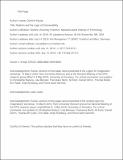Realism and the logic of conceivability
Author(s)
Kauss, Dominik
Download11098_2020_1413_ReferencePDF.pdf (181Kb)
Publisher Policy
Publisher Policy
Article is made available in accordance with the publisher's policy and may be subject to US copyright law. Please refer to the publisher's site for terms of use.
Terms of use
Metadata
Show full item recordAbstract
On their alethic reading, formulas (T), (D), and (K) codify three of the most basic principles of possibility and its dual (necessity). This paper discusses these formulas on a broadly epistemic reading, and in particular as candidate principles about conceivability and its dual (inconceivability of the opposite). As will be shown, the question whether (T) and its classical dual equivalent, as well as (D) and (K) hold on this reading is not only a logical one but involves a distinctively metaphysical controversy between realist and antirealist views on the relation between truth on the one hand and various cognitive conditions such as knowability, conceivability, and thinkability on the other. It will be argued that the stance we take with regard to the metaphysical dispute has consequences for our assessment of the plausibility not only of (T) and its classical equivalent, but also of (D) and—when that stance is combined with a structural account of propositions—potentially of (K) as well; with all four taken in the above epistemic sense. A second upshot will be that the same sensitivity to metaphysical background commitment also applies to our view as to whether or not inconceivability of the opposite coincides with, or even entails, apriority.
Date issued
2020-01Department
Massachusetts Institute of Technology. Department of Linguistics and PhilosophyJournal
Philosophical Studies
Publisher
Springer Science and Business Media LLC
Citation
Kauss, Dominik et al. "Realism and the logic of conceivability." Philosophical Studies 177, 12 (January 2020): 3885–3902 © 2020 Springer Nature B.V.
Version: Author's final manuscript
ISSN
0031-8116
1573-0883